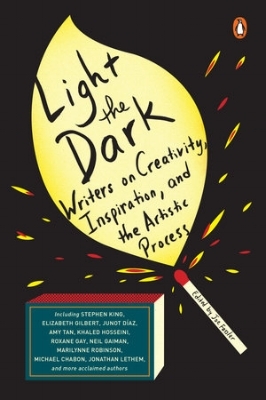4 (Possible) Reasons Why We Write
 It is the nature of writers to wonder. We wonder about others and we wonder about ourselves. We even wonder why we write.
It is the nature of writers to wonder. We wonder about others and we wonder about ourselves. We even wonder why we write.
For most of us the compulsion to write is so… ineffable. Why do we write? We just do. We desire the stories. We love the words. We are compelled to communicate our wonder with the world. We write because we must.
But why must we?
Money, fame, success?
Maybe. In a way. But that’s not really it, is it?
The need to tell stories is universal—across time, across space. Indeed, we might even say the world itself is a story–the structured turning of the planets, the rise and fall of seasons, the beginning and ending of lives beyond number.
Something in the soul of the human recognizes this, resonates with it like the plucked string of a violin, responds to it with passionate verve.
But why? Why, why, why?
Even the word itself is an undeniable call for a story.
So today, let’s tell ourselves the story of why we write. It will be just one story among many, one tiny part of an answerable answer. But it is a worthwhile narrative for any writer—indeed, any creator—to pursue. Why we are driven to tell stories is at the heart of everything we write. Realizing this can help open up a new understanding of how to write bigger, better, clearer, and keener.
4 Reasons Why We Write
I think one of the reasons we find this question fascinating is that it has no absolute answer. Indeed, the answer is a part of Truth itself—infinite and ultimately ungraspable by our finite minds. As a result, our response to the question of why we write must inevitably be broken down into any number of smaller truths that, although incomplete (and sometimes subjective), help us glimpse the larger Truth.
 I started out the year by finishing the excellent essay anthology Light the Dark: Writers on Creativity, Inspiration, and the Artistic Process. In it, respected authors were invited to share passages from their own reading that they felt were formative to their journeys as writers. The insights are vast, and as varied as the authors, but those I found most enlightening directly responded to why these people were inspired to become authors.
I started out the year by finishing the excellent essay anthology Light the Dark: Writers on Creativity, Inspiration, and the Artistic Process. In it, respected authors were invited to share passages from their own reading that they felt were formative to their journeys as writers. The insights are vast, and as varied as the authors, but those I found most enlightening directly responded to why these people were inspired to become authors.
It also made me ponder my own influences, which is something I hope to share in a future post. But for today, I want to share four of the major reasons we write, all of which jumped out at me from the responses in Light the Dark.
1. Writing Joins Us to a Community… of the Like and Unlike

I used to loathe the idea that stories were escapism. This was for two reasons:
1. I resented the notion that, in enjoying stories, I needed to escape—that I wasn’t brave enough or honest enough to face the world as it is.
2. I instinctively, if inarticulately, rejected the idea that stories weren’t essentially important—that they were little more than a soporific for the ignorant masses.
Now, however, I see the truth that, yes, stories are adamantly about escape. But rather than allowing us to escape out of our lives, they instead allow us to escape into the broader community of the world itself—both present and past.
Good stories bring us face to face with ourselves. They are a mirror of our faults, our strengths, our quirks, and our experiences.
Life is nothing if not dichotomous. We’re all in it together, and yet each of us must face it alone. We all walk side by side down exactly the same road, from birth to death, and yet no one can truly accompany us on our own journeys. No one can truly know us; we don’t even ever truly know ourselves.
But in stories, in writing, we tap into a collective soul. How many of us, as young readers, happened onto some random passage that suddenly made us sit up, made our spines go cold, made us almost gasp with the shock realizing that someone else was like us? Someone else knew exactly what we were thinking, maybe even before we knew we were thinking it.
The more fiction allows us to resonate with all the ways we are alike, the more it also allows us to accept and appreciate and learn from the ways we are different.
2. Writing Lets Us Unmask Ourselves… to Ourselves

First comes that moment when a story tells us: Yes, this is who you are. I see you. I know you. I accept you.
That moment is a doorway of no return (a First Plot Point of sorts). Once we step through it, we are then further challenged to use our experience of stories, both as readers and writers, to be honest with ourselves.
After all, if even the books of strangers recognize us, then mustn’t we be brave enough to also recognize ourselves?
In its brutal demand for honesty, storytelling is but a microcosm of life itself. If we hope to succeed as writers (or as human beings?), we must pursue Truth to the end of every horizon. Will we ever catch it? I don’t know. I tend to think not. I certainly haven’t yet. But I know I must chase it.
This would be true for me whether I was a writer or not. But as a writer, I am given unique and powerful tools for discovering the masks I wear, the reasons I wear them, and how I may shed them to live a better life and write better stories.
Good stories change the world. They do this for the simple reason that their authors caught a piece of the Truth and were brave enough to write about it. The Truth is ever-frightening. Perhaps this is because, in looking into its face, however briefly and sidelong, we look into the enormity of the infinite. But these pieces of Truth change us forever. They show us the commonality in our individual stories. They are what allow us to tap into that community of the human soul.
3. Writing Tells Us Who We Are and What Life We’re Living

We will never know anyone as well as we know ourselves. And yet we will never be blinder to anyone than we are to ourselves. As much as our writing is a discovery of the world around us, it is also a discovery of ourselves.
 My writing teaches me who I am. So often, without even intending it, I discover the themes I’m writing about reverberating in my own life. I was shocked a few years ago when a reviewer of my portal fantasy Dreamlander pointed out that the integral themes of my life were also the integral (if unintended) themes of my fiction:
My writing teaches me who I am. So often, without even intending it, I discover the themes I’m writing about reverberating in my own life. I was shocked a few years ago when a reviewer of my portal fantasy Dreamlander pointed out that the integral themes of my life were also the integral (if unintended) themes of my fiction:
The consistent theme in each of her books is finding the best in human relationships and coming to an understanding about who you are and what you believe.
I resonated with Amy Tan’s quote because her words were almost exactly my own in reading that review. That review was a lightening of the veil that allowed me to see start seeing myself more and more clearly through my own fiction.
I never consciously write about my own life; I never use people I know as characters. And yet, of course I do. Every character I write is me. Every word out of their mouths tells me truths about myself that I have yet to realize. And, in so doing, they offer me the opportunity to understand what it is I’m really doing on this earth. Why am I here? What is my mission statement? What is my story?
Subconsciously, that is the story I’m telling whenever I sit down to write.
4. Writing Lets Us Speak the Truth

The truth is hard to speak, for many reasons. For one thing, it can be dangerous. In some societies, it will get you jailed, or worse. But even when it’s supposedly socially acceptable, the truth is rarely considered good table manners. An oft-quoted proverb says:
The truth will set you free. But first it will make you mad.
The journey toward truth’s freedom is laborious, painful, frustrating, and terrifying. (Just ask any of your characters.)
The act of writing—the construct of putting feelings and instincts into words—automatically places a degree of distance between us and the truth. It lets us take a step back and examine it from a safer distance. If it also happens that what you’re writing is fiction, you’re given an even darker pair of shades through which to view the sun without nuking your eyeballs.
In writing fiction, we are becoming our characters—we are becoming something other. In essence, this allows us to step outside our lives, even outside the world itself. It’s an out-of-body experience that grants us an unprecedented opportunity to view the larger picture with all the objectivity we can muster.
And then, as writers, we get to share that objectivity with others, in the least threatening way possible: through a lie that tells the truth.
And the greatest irony? In telling truths through the untruths of fiction, what we’re really doing is wielding one of our greatest weapons against the larger lies of real life. As Ayana Mathis (also in Light the Dark) put it:
…writing is a way of working against belligerent unreality.
***
Why do we write? For all these reasons. And for more. We might as well ask: Why do we love? or Why do we live?
And yet, as with those questions, we must keep seeking the answers. As a paperweight someone gave me says,
Be wild and wonder.
We’re writers. It’s what we do.
Wordplayers, tell me your opinion! Why do you write? Tell me in the comments!
http://www.podtrac.com/pts/redirect.mp3/kmweiland.com/podcast/4-possible-reasons-why-we-write.mp3
Click the “Play” button to Listen to Audio Version (or subscribe to the Helping Writers Become Authors podcast in iTunes).
The post 4 (Possible) Reasons Why We Write appeared first on Helping Writers Become Authors.



